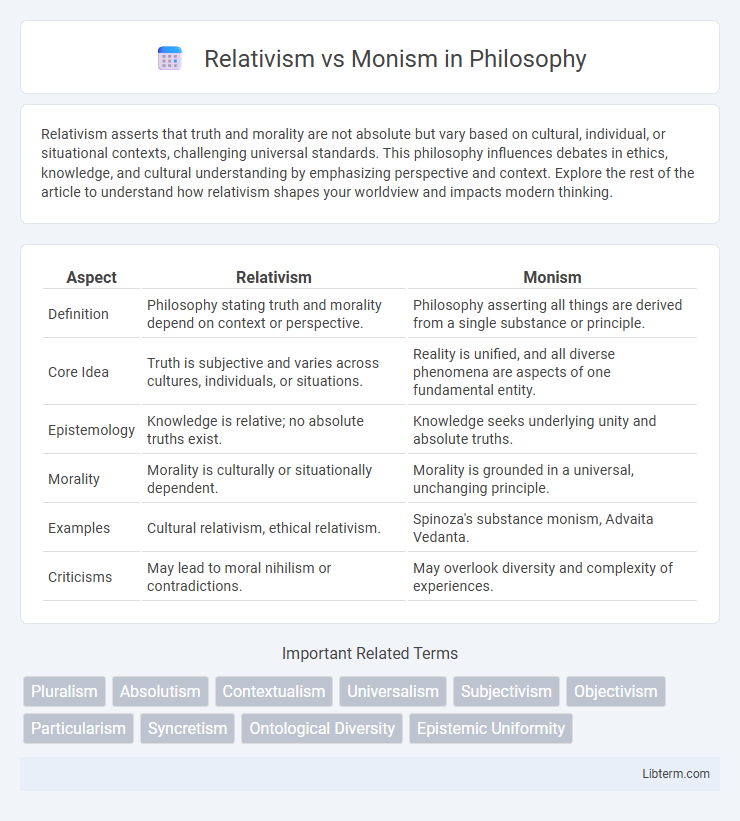Relativism asserts that truth and morality are not absolute but vary based on cultural, individual, or situational contexts, challenging universal standards. This philosophy influences debates in ethics, knowledge, and cultural understanding by emphasizing perspective and context. Explore the rest of the article to understand how relativism shapes your worldview and impacts modern thinking.
Table of Comparison
| Aspect | Relativism | Monism |
|---|---|---|
| Definition | Philosophy stating truth and morality depend on context or perspective. | Philosophy asserting all things are derived from a single substance or principle. |
| Core Idea | Truth is subjective and varies across cultures, individuals, or situations. | Reality is unified, and all diverse phenomena are aspects of one fundamental entity. |
| Epistemology | Knowledge is relative; no absolute truths exist. | Knowledge seeks underlying unity and absolute truths. |
| Morality | Morality is culturally or situationally dependent. | Morality is grounded in a universal, unchanging principle. |
| Examples | Cultural relativism, ethical relativism. | Spinoza's substance monism, Advaita Vedanta. |
| Criticisms | May lead to moral nihilism or contradictions. | May overlook diversity and complexity of experiences. |
Introduction to Relativism and Monism
Relativism asserts that truth and moral values depend on cultural, individual, or situational contexts, rejecting absolute standards. Monism, in contrast, posits a single, unifying principle or reality, such as the belief in one fundamental substance or truth. Philosophical debates on ethics, metaphysics, and knowledge often center around the tension between these perspectives, influencing diverse interpretations of reality and morality.
Defining Relativism: Core Principles
Relativism asserts that truth and moral values are not absolute but vary based on cultural, individual, or contextual perspectives, emphasizing the subjective nature of knowledge. It challenges universal standards by promoting the idea that understanding is dependent on specific frameworks, whether social norms or personal beliefs. This core principle underpins ethical relativism, cultural relativism, and epistemological relativism, highlighting diversity in truth claims across different domains.
Monism Explained: A Unified Perspective
Monism posits that all reality is fundamentally composed of a single substance or principle, offering a unified perspective that contrasts sharply with the fragmented nature of relativism. This philosophy asserts that diverse phenomena and perceptions are manifestations of one underlying essence, such as consciousness, matter, or spirit, eliminating dualistic distinctions. By emphasizing oneness, monism provides a coherent framework for understanding existence, knowledge, and morality as interconnected aspects of a singular reality.
Historical Origins and Philosophical Background
Relativism traces its roots to ancient sophists like Protagoras, who asserted that truth varies according to individual perception and cultural context, challenging absolute knowledge claims. Monism, originating with pre-Socratic philosophers such as Parmenides and later advanced by Spinoza, posits that reality is unified and singular, emphasizing an underlying substance or principle that constitutes all existence. These foundational perspectives highlight the philosophical tension between acknowledging diverse viewpoints versus asserting a single, coherent reality.
Key Differences Between Relativism and Monism
Relativism asserts that truth and morality vary based on culture, context, or individual perspective, emphasizing multiplicity and diversity in interpretation. Monism, in contrast, holds that there is a single, unified reality or truth underlying all phenomena, advocating for an absolute or universal principle. The key difference lies in relativism's acceptance of multiple truths versus monism's pursuit of one fundamental truth.
Relativism in Ethics and Culture
Relativism in ethics and culture argues that moral principles and cultural norms are not universal but vary based on individual societies and historical contexts, emphasizing the importance of understanding diverse perspectives without imposing absolute standards. This approach challenges ethnocentrism and promotes tolerance by recognizing that values and ethical judgments are shaped by social, cultural, and environmental factors. Relativism supports the idea that ethical decisions should be evaluated within their cultural frameworks, rather than by external or fixed moral codes.
Monism in Science and Metaphysics
Monism in science and metaphysics posits that all phenomena originate from a single substance or principle, whether material or spiritual, offering a unified framework for understanding reality. This approach contrasts with relativism by emphasizing absolute, consistent truths rather than perspectives shaped by context or culture. Key scientific theories, such as physicalism, and metaphysical doctrines like idealism, exemplify monism by asserting that diverse experiences are manifestations of one fundamental entity.
Arguments for and Against Relativism
Relativism argues that truth and moral values are context-dependent and vary across cultures and individuals, highlighting the importance of perspective and tolerance in understanding diverse viewpoints. Critics claim relativism undermines objective standards, leading to moral ambiguity and the inability to resolve conflicts effectively. Defenders counter that rigid monism often ignores cultural complexity and enforces dominant norms, risking ethnocentrism and injustice.
Critiques and Defenses of Monism
Critiques of monism highlight its tendency to oversimplify reality by reducing diverse phenomena to a single substance or principle, potentially ignoring the complexity and multiplicity observed in human experience and scientific data. Defenses argue that monism provides a coherent, unified framework that explains interconnectedness and avoids contradictions inherent in relativist perspectives. Philosophers like Spinoza and Advaita Vedanta proponents emphasize monism's power to reveal the underlying oneness of existence, while critics stress the necessity of pluralism to accommodate differing viewpoints and cultural contexts.
Conclusion: Bridging Relativism and Monism
Bridging relativism and monism involves recognizing the value of multiple perspectives while seeking an underlying unity that connects them. Integrative approaches emphasize that diverse truths can coexist within a single framework, enriching understanding rather than fragmenting it. This synthesis promotes a balanced worldview, combining the flexibility of relativism with the coherence of monism.
Relativism Infographic

 libterm.com
libterm.com